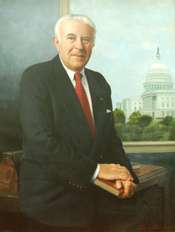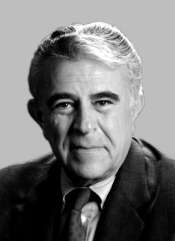Benjamin A. Gilman
| Benjamin A. Gilman | |
|---|---|
 | |
| Member of the U.S. House of Representatives from New York's 20th, 22nd, & 26th district | |
|
In office January 3, 1973 – January 3, 1983 (26th) January 3, 1983 – January 3, 1993 (22nd) January 3, 1993 – January 3, 2003 (20th) | |
| Preceded by |
Ogden R. Reid (1973) Jonathan B. Bingham (1983) Nita Lowey (1993) |
| Succeeded by |
David O. Martin (1983) Gerald B. H. Solomon (1993) John E. Sweeney (2003) |
| Personal details | |
| Born |
December 6, 1922 Poughkeepsie, New York |
| Political party | Republican |
| Spouse(s) |
Jane Prizant (divorced, 1954–1978; 4 children) Rita Kelhofer (divorced, 1984–1997) Georgia Tingus |
| Religion | Judaism[1] |
Benjamin Arthur "Ben" Gilman (born December 6, 1922) is a former Republican United States Representative from New York.
Early life
Born in Poughkeepsie, New York, Gilman graduated from Middletown High School in Middletown, New York in 1941 and received a B.S. from the Wharton School Finance at the University of Pennsylvania in 1946. He also earned an LL.B. from New York Law School. Gilman served in the United States Army Air Corps from 1942 until 1945 during World War II. During that conflict, he flew 35 missions over Japan, earning the Distinguished Flying Cross and the Air Medal with Oak Leaf Clusters.
Career
A graduate of New York Law School (1950), he served as assistant attorney general to the New York State Attorney General from 1953 until 1955. Following this, he practiced law privately in his hometown of Middletown, New York.
Gilman was a member of the New York State Assembly from 1967 to 1972, sitting in the 177th, 178th and 179th New York State Legislatures. He was a member of the New York State Southeastern Water Commission.
He was elected to Congress in 1972 to represent New York's 26th congressional district, defeating John G. Dow, a Democratic incumbent who had been serving in the New York's 27th congressional district (which included most of the territory and population of the new 26th district), and served from January 3, 1973 until January 3, 2003. During his time in Congress, he was chair of the House Committee on International Relations (104th through 106th Congresses).
Gilman served as a Congressional delegate to the United Nations, serving under Ambassador Jeane Kirkpatrick in 1981. He was a Member of the Ukraine Famine Commission, a member of the U.S., European, Canadian and Mexican Interparliamentary conferences, and a Congressional Advisor to the U.N. Law of the Sea Conference. He was co-chair of the Committee on Irish Affairs and participated on the International Task Force on Narcotics. He is a recipient of the Secretary's Distinguished Service Award, a gold medal and certificate that represent the highest civilian honor bestowed by the State Department.
Throughout his years in Congress, he was a member of the House Post Office and Civil Service Committee, the name of which evolved into the Government Reform and Oversight Committee in the 1990s. As a co-founder of the House Select Committee on Narcotics, he served as a senior member on that Committee (1977–1989) and continued to serve as a member until the Committee was abolished in 1993.
During the 1970s, Gilman became closely identified with the issue of Prisoners of War and Missing in Action in Southeast Asia. He served on the Select Congressional Committee on that problem, and was one of only two Members of Congress to vote in opposition to closing the book on the POW/MIA situation.
He also become involved with world hunger in the 1970s, authoring the legislation creating a presidential Commission Against Hunger, to which he was subsequently appointed by President Jimmy Carter.
As the chair of the House Committee on Foreign Affairs, Congressman Gilman consistently advocated stronger ties with India[2] , as a counterweight against Chinese influence in the region, particularly in Pakistan. During the Kargil War against Pakistan, he urged American lawmakers to pressure the Pakistani government to withdraw from the conflict, stating that he held Pakistan solely responsible for the conflict[3] . In recognition of his contribution to furthering US ties with India, he was awarded that country's second highest civilian honor, the Padma Vibhushan, in 2001.[4] He is one of only 12 foreigners, and one of only 3 Americans not of Indian origin, to receive the award.
Gilman was also an important Congressional supporter of the Church of Scientology. He "received thousands from the church, and, in return, as chairman of the International Relations Committee, he complained on several occasions that European nations were discriminating against Scientology. . . . He was also thanked with [a] glowing profile in the church's Freedom magazine."[5]

Congressman Ben Gilman retired in 2003 after New York's 20th congressional district, which he had represented, was broken up and dispersed among the 17th, 18th, 19th and 22nd Congressional Districts in the redistricting that followed the 2000 census and reapportionment. At the time of his retirement, Gilman was the oldest sitting representative in the U.S. House (in all of Congress, only Senators Strom Thurmond and Robert Byrd were older). He was the senior Republican representing New York, and the senior Member from New York overall with the exception of Charles B. Rangel.
On March 28, 2008, Gilman participated in the ribbon cutting ceremony for the Gilman Center for International Education in his hometown of Middletown, New York, on the campus of SUNY Orange, also known as Orange County Community College. This modern new facility for international studies is expected to attract students from throughout the world, and houses Gilman's public papers from throughout his 36 years in elective office. Various photographs and memorabilia from throughout his career are on display.
Personal life
Gilman has been married three times, to the former Jane Prizant (1927–2000), a lawyer and daughter of a well-known actor of the Yiddish theater (Hyman Prizant), Rita Kelhofer, and Georgia Tingus. His children (from the first marriage to Jane Prizant) are Jonathan Gilman, Susan Gilman-Harts, Harrison Gilman, David Gilman (deceased) and Ellen Gilman (deceased). He continues to live in Middletown, his home in the Hudson Valley district that he represented.
References
- ↑ Stone, Kurt F. "The Jews of Capitol Hill: A Compendium of Jewish Congressional Members, (2011). Pages 278–281. ISBN 9780810857315.
- ↑ Haniffa, Aziz (2001-07-18). "Lawmaker slams Pak, China". rediff.com. Retrieved 2009-02-02.
- ↑ Gilman, Benjamin; Gejdenson, Sam (1999-06-21). "Letter on Kargil Situation".
- ↑ "Ministry of Home Affairs: Padma Awards". Ministry of Home Affairs, Government of India. 2001-01-26. Retrieved 2009-02-02.
- ↑ Pareene, Alex (2011-02-10) The Church of Scientology's friends in Washington, Salon.com
External links
| Wikisource has original works written by or about: Benjamin Arthur Gilman |
- Benjamin A. Gilman at the Biographical Directory of the United States Congress Retrieved on 2008-03-18
- Appearances on C-SPAN
| New York Assembly | ||
|---|---|---|
| Preceded by Benjamin Altman |
New York State Assembly 95th District 1967–1972 |
Succeeded by Eugene Levy |
| Political offices | ||
| Preceded by Lee H. Hamilton Indiana |
Chairman of the House International Relations Committee 1995–2001 |
Succeeded by Henry Hyde Illinois |
| United States House of Representatives | ||
| Preceded by Ogden R. Reid |
Member of the U.S. House of Representatives from New York's 26th congressional district 1973–1983 |
Succeeded by David O'B. Martin |
| Preceded by Jonathan B. Bingham |
Member of the U.S. House of Representatives from New York's 22nd congressional district 1983–1993 |
Succeeded by Gerald B. H. Solomon |
| Preceded by Nita M. Lowey |
Member of the U.S. House of Representatives from New York's 20th congressional district 1993–2003 |
Succeeded by John E. Sweeney |
|